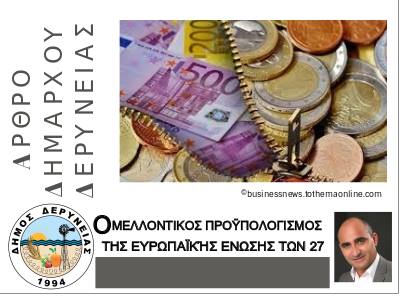The new multiannual financial framework of the European Union (EU) which will be implemented, as announced, on 1 January 2021 and will be the first budget of the 27 Member States after Brexit and the subsequent withdrawal of Great Britain from the EU In the coming months, the EU will be called upon to make major decisions concerning the main problems currently facing the Member States, such as immigration, terrorism, populism, fake news, climate change, youth unemployment, etc.
To address the new challenges, the European Commission is proposing a new and long-term multiannual financial framework for the period 2021-2027. According to this, each Member State, as a beneficiary of a grant, must respect the rule of law, the faithful implementation of sound financial management and the effective unification financing in the interests of its citizens. However, the departure of a major financier, such as the United Kingdom, will result in cuts of 6,2% in the new budget.
This new long-term EU budget is divided into seven thematic expenditure priorities, through which funds will be distributed based on the needs of the Member States. Particular emphasis is placed on the digital economy, sustainability, security, migration, human resources and finally on supporting small and medium-sized enterprises and innovation.
In the chapter on cohesion and values, priority is given to the youth and especially to the doubling of the sponsorship for the implementation of the Erasmus + program, one of the most successful programs of the EU. which provides opportunities for young people to learn foreign languages, stay and work abroad. The aim of the program is to take advantage of this opportunity mainly by young people from vulnerable groups. The budget of the new enhanced Erasmus + program is thus estimated to reach 30 billion euros.
As for the fisheries and agriculture sectors, they will be supported through the Natural Resources and Environment chapter of the relevant budget, which seeks to emphasize high quality, affordability, nutrition and variety of food. In fact, the European Maritime and Fisheries Fund will support the fisheries sector, the promotion of the blue economy in aquaculture, tourism and the protection of the marine environment.
The EU budget will be significantly increased. in the field of migration and border management, as it will amount to 33 billion euros compared to 12,4 billion euros in the period 2014-2020. This in itself confirms the needs of European leaders due to the influence of immigrants / refugees in Europe, since it is proposed to create a permanent body of border guards, about 10.000 people, by the end of the new fiscal plan.
The EU The 27-year-old seems to have reconsidered her priorities for the new seven years. Certainly these priorities cannot be met by all Member States, and in particular by the citizens of those States. On the positive side of this review is of course the investment in the fields of research, technology, innovation, digital economy, which will bring significant benefits to future generations due to the development observed in the aforementioned fields.
Of course, the reduction of funds earmarked for Rural Development, the Common Agricultural Policy and Cohesion Policy should not go unnoticed, in order to free up resources to support other activities, such as security and external action. The primary sector also attracts many young scientists, who are interested in creating their own agricultural, livestock, biological units or small businesses. That is why rural areas and the province need further support from the EU.
In any case, Europe must become an area of prosperity, peace and social solidarity. But Europe wants to keep migrants / refugees away by strengthening its coastline, while at the same time limiting funding from areas that attract young people, with the result that they are migrating. Europe has thus acquired a dual status both as a recipient and as a sender of migrants. But what must be consolidated as an idea is that these immigrants of all kinds are the ones who will bring children into the world, in order to regenerate and renew the "old Epirus".
Andros G. Karagiannis
Mayor of Deryneia
